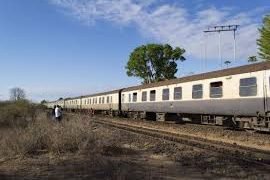By Maria Kalamatas
Nairobi, KENYA —
Kenya and Turkey have formalized a landmark bilateral agreement to co-develop logistics infrastructure across East Africa, with the centerpiece being a rail link between Mombasa and Kisumu, fully equipped with Turkish rail technology.
Signed on May 1 in Ankara, the agreement includes provisions for technical assistance, equipment supply, and infrastructure financing—all aimed at turning Kenya into a regional logistics hub for landlocked neighbors like Uganda, Rwanda, and South Sudan.
“This is not just a trade agreement—it’s a transformation agenda,” said Kipchumba Murkomen, Kenya’s Cabinet Secretary for Transport. “Turkey brings not only capital, but decades of expertise in freight railway modernization.”
Strategic gains for both sides
Turkey, facing saturation in its traditional export markets, views East Africa as a strategic expansion zone. The new railway corridor, expected to begin construction by Q2 2026, will be modeled after Turkish State Railways’ (TCDD) dual-track standard gauge system.
“This is smart geopolitical logistics,” said Dr. Erdem Atalay, Professor of Transport Strategy at Istanbul Technical University. “Turkey needs diversified outbound routes. Kenya offers proximity, political alignment, and a port with expansion potential.”
Beyond rail: multimodal ambitions
In addition to the Kisumu rail extension, the agreement includes plans to upgrade Mombasa Port’s inland container depot, develop a dry port near Eldoret, and introduce Turkish smart logistics platforms to track cargo in real time across borders.
According to Kenya Ports Authority (KPA), once complete, the corridor could reduce cargo transit time to Uganda from 5 days to 36 hours, making it the fastest overland route in East Africa.
Private sector interest already heating up
Several Turkish firms—such as Çalık Holding and Yapı Merkezi—have signaled interest in bidding for the projects. Kenyan logistics companies, meanwhile, are preparing for integration opportunities.
“We’re mapping our entire fleet transition based on this corridor,” said Peter Odhiambo, CEO of TransKisumu Freightline. “It will redefine how we serve Western Kenya and beyond.”
A regional game changer
With Chinese influence in African logistics infrastructure increasingly questioned, Turkey’s entry into the space may represent a new model: mid-scale, politically neutral partnerships with faster execution timelines.
As Murkomen summarized, “This is Kenya’s logistics decade—and this partnership is how we’ll build it.”





















